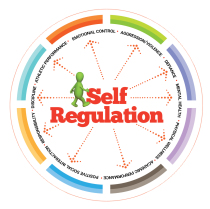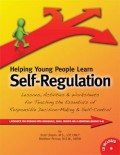What is Self-Regulation?
Self-regulation is a universal set of skills that helps us manage our responses to things that happen in our lives. We have very little control over the events that happen around us, but we have a great deal of control over our responses to those events. A simple analogy would be to compare self-regulation to the job of a thermostat. The thermostat constantly monitors the environment and when it detects a change it makes a decision about what to do and carries it out.
Those who regulate themselves well are more successful, happier and live longer than those who don't. We spend a great deal of time training professionals and parents about how to teach self-regulation skills to children.
Learning to effectively regulate feelings, thoughts and behaviors can significantly improve ones quality of life. Self-regulation skills are related to success in many areas of life including:
- Relationships
- Academic performance
- Mental health
- Job performance
- Physical health/well-being
- Athletic performance
- Happiness
Self-Regulation in 3 Steps
We break Self-regulation skills into 3 main areas:
- Physical
- Emotional
- Cognitive
The Physical self-regulation skills include identifying warning signs and learning how to calm the body down. The Emotional skills address the identification and expression of feelings. We also work to instill a sense of empowerment and responsibility for one's own emotions in this section. The Cognitive domain involves healthy vs. unhealthy thoughts, organization/planning and motives for behaviors.
"Helping Young People Learn Self-Regulation"
For interactive strategies and a more detailed look at the framework, see Brad's BEST-SELLING book. Available from Youthlight Publishing and Amazon.
*The strategies and curriculum contained in this book resulted in significant changes in student self-regulation skills, teacher attitude and office discipline referrals.
NEW EVIDENCE-BASED RESEARCH ARTICLE
Abstract - This article seeks to demonstrate the effectiveness of an age-specific, manualized self-regulation treatment approach, Self-Regulation Training System (SRTS). SRTS interventions were implemented through waitlist control design over a span of two months to students in fourth grade classes from eight different elementary schools in the Midwestern United States (N = 373). The sample comprised of 52% boys, with an average age of 9.25 (SD = 0.45). A significant increase in average teacher-reported self-regulation scores was observed in both waitlist and experimental groups after the intervention was administered. In addition, students’ problem behaviors increased in the waitlist group when students had not received the intervention and remained stable once students experienced the intervention in both the experimental and waitlist conditions. Overall, the results provide initial evidence that the classroom wide interventions like the SRTS may be helpful in promoting self-regulation skills in children. Interventions such as the SRTS provide a feasible way for schools to promote self-regulation skills and influence problem behaviors in the classroom. Full Article
For more detailed information on Self-Regulation Training with specific topics and stories click here to visit our BLOG.






